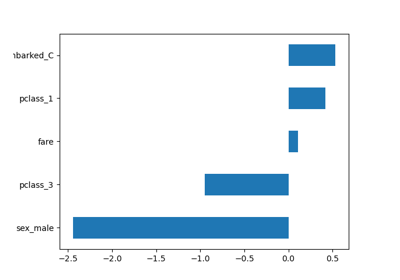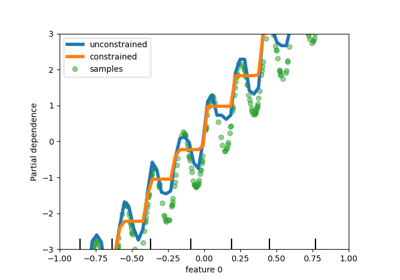Note
Go to the end to download the full example code or to run this example in your browser via JupyterLite or Binder.
Displaying Pipelines#
The default configuration for displaying a pipeline in a Jupyter Notebook is
'diagram' where set_config(display='diagram'). To deactivate HTML representation,
use set_config(display='text').
To see more detailed steps in the visualization of the pipeline, click on the steps in the pipeline.
# Authors: The scikit-learn developers
# SPDX-License-Identifier: BSD-3-Clause
Displaying a Pipeline with a Preprocessing Step and Classifier#
This section constructs a Pipeline with a preprocessing
step, StandardScaler, and classifier,
LogisticRegression, and displays its visual
representation.
from sklearn import set_config
from sklearn.linear_model import LogisticRegression
from sklearn.pipeline import Pipeline
from sklearn.preprocessing import StandardScaler
steps = [
("preprocessing", StandardScaler()),
("classifier", LogisticRegression()),
]
pipe = Pipeline(steps)
To visualize the diagram, the default is display='diagram'.
set_config(display="diagram")
pipe # click on the diagram below to see the details of each step
Pipeline(steps=[('preprocessing', StandardScaler()),
('classifier', LogisticRegression())])In a Jupyter environment, please rerun this cell to show the HTML representation or trust the notebook. On GitHub, the HTML representation is unable to render, please try loading this page with nbviewer.org.
Parameters
Parameters
Parameters
To view the text pipeline, change to display='text'.
set_config(display="text")
pipe
Pipeline(steps=[('preprocessing', StandardScaler()),
('classifier', LogisticRegression())])
Put back the default display
set_config(display="diagram")
Displaying a Pipeline Chaining Multiple Preprocessing Steps & Classifier#
This section constructs a Pipeline with multiple
preprocessing steps, PolynomialFeatures and
StandardScaler, and a classifier step,
LogisticRegression, and displays its visual
representation.
from sklearn.linear_model import LogisticRegression
from sklearn.pipeline import Pipeline
from sklearn.preprocessing import PolynomialFeatures, StandardScaler
steps = [
("standard_scaler", StandardScaler()),
("polynomial", PolynomialFeatures(degree=3)),
("classifier", LogisticRegression(C=2.0)),
]
pipe = Pipeline(steps)
pipe # click on the diagram below to see the details of each step
Pipeline(steps=[('standard_scaler', StandardScaler()),
('polynomial', PolynomialFeatures(degree=3)),
('classifier', LogisticRegression(C=2.0))])In a Jupyter environment, please rerun this cell to show the HTML representation or trust the notebook. On GitHub, the HTML representation is unable to render, please try loading this page with nbviewer.org.
Parameters
Parameters
Parameters
Parameters
Displaying a Pipeline and Dimensionality Reduction and Classifier#
This section constructs a Pipeline with a
dimensionality reduction step, PCA,
a classifier, SVC, and displays its visual
representation.
Pipeline(steps=[('reduce_dim', PCA(n_components=4)),
('classifier', SVC(kernel='linear'))])In a Jupyter environment, please rerun this cell to show the HTML representation or trust the notebook. On GitHub, the HTML representation is unable to render, please try loading this page with nbviewer.org.
Parameters
Parameters
Parameters
Displaying a Complex Pipeline Chaining a Column Transformer#
This section constructs a complex Pipeline with a
ColumnTransformer and a classifier,
LogisticRegression, and displays its visual
representation.
import numpy as np
from sklearn.compose import ColumnTransformer
from sklearn.impute import SimpleImputer
from sklearn.linear_model import LogisticRegression
from sklearn.pipeline import Pipeline, make_pipeline
from sklearn.preprocessing import OneHotEncoder, StandardScaler
numeric_preprocessor = Pipeline(
steps=[
("imputation_mean", SimpleImputer(missing_values=np.nan, strategy="mean")),
("scaler", StandardScaler()),
]
)
categorical_preprocessor = Pipeline(
steps=[
(
"imputation_constant",
SimpleImputer(fill_value="missing", strategy="constant"),
),
("onehot", OneHotEncoder(handle_unknown="ignore")),
]
)
preprocessor = ColumnTransformer(
[
("categorical", categorical_preprocessor, ["state", "gender"]),
("numerical", numeric_preprocessor, ["age", "weight"]),
]
)
pipe = make_pipeline(preprocessor, LogisticRegression(max_iter=500))
pipe # click on the diagram below to see the details of each step
Pipeline(steps=[('columntransformer',
ColumnTransformer(transformers=[('categorical',
Pipeline(steps=[('imputation_constant',
SimpleImputer(fill_value='missing',
strategy='constant')),
('onehot',
OneHotEncoder(handle_unknown='ignore'))]),
['state', 'gender']),
('numerical',
Pipeline(steps=[('imputation_mean',
SimpleImputer()),
('scaler',
StandardScaler())]),
['age', 'weight'])])),
('logisticregression', LogisticRegression(max_iter=500))])In a Jupyter environment, please rerun this cell to show the HTML representation or trust the notebook. On GitHub, the HTML representation is unable to render, please try loading this page with nbviewer.org.
Parameters
Parameters
['state', 'gender']
Parameters
Parameters
['age', 'weight']
Parameters
Parameters
Parameters
Displaying a Grid Search over a Pipeline with a Classifier#
This section constructs a GridSearchCV
over a Pipeline with
RandomForestClassifier and displays its visual
representation.
import numpy as np
from sklearn.compose import ColumnTransformer
from sklearn.ensemble import RandomForestClassifier
from sklearn.impute import SimpleImputer
from sklearn.model_selection import GridSearchCV
from sklearn.pipeline import Pipeline, make_pipeline
from sklearn.preprocessing import OneHotEncoder, StandardScaler
numeric_preprocessor = Pipeline(
steps=[
("imputation_mean", SimpleImputer(missing_values=np.nan, strategy="mean")),
("scaler", StandardScaler()),
]
)
categorical_preprocessor = Pipeline(
steps=[
(
"imputation_constant",
SimpleImputer(fill_value="missing", strategy="constant"),
),
("onehot", OneHotEncoder(handle_unknown="ignore")),
]
)
preprocessor = ColumnTransformer(
[
("categorical", categorical_preprocessor, ["state", "gender"]),
("numerical", numeric_preprocessor, ["age", "weight"]),
]
)
pipe = Pipeline(
steps=[("preprocessor", preprocessor), ("classifier", RandomForestClassifier())]
)
param_grid = {
"classifier__n_estimators": [200, 500],
"classifier__max_features": ["auto", "sqrt", "log2"],
"classifier__max_depth": [4, 5, 6, 7, 8],
"classifier__criterion": ["gini", "entropy"],
}
grid_search = GridSearchCV(pipe, param_grid=param_grid, n_jobs=1)
grid_search # click on the diagram below to see the details of each step
GridSearchCV(estimator=Pipeline(steps=[('preprocessor',
ColumnTransformer(transformers=[('categorical',
Pipeline(steps=[('imputation_constant',
SimpleImputer(fill_value='missing',
strategy='constant')),
('onehot',
OneHotEncoder(handle_unknown='ignore'))]),
['state',
'gender']),
('numerical',
Pipeline(steps=[('imputation_mean',
SimpleImputer()),
('scaler',
StandardScaler())]),
['age',
'weight'])])),
('classifier',
RandomForestClassifier())]),
n_jobs=1,
param_grid={'classifier__criterion': ['gini', 'entropy'],
'classifier__max_depth': [4, 5, 6, 7, 8],
'classifier__max_features': ['auto', 'sqrt', 'log2'],
'classifier__n_estimators': [200, 500]})In a Jupyter environment, please rerun this cell to show the HTML representation or trust the notebook. On GitHub, the HTML representation is unable to render, please try loading this page with nbviewer.org.
Parameters
Parameters
['state', 'gender']
Parameters
Parameters
['age', 'weight']
Parameters
Parameters
Parameters
Total running time of the script: (0 minutes 0.139 seconds)
Related examples



